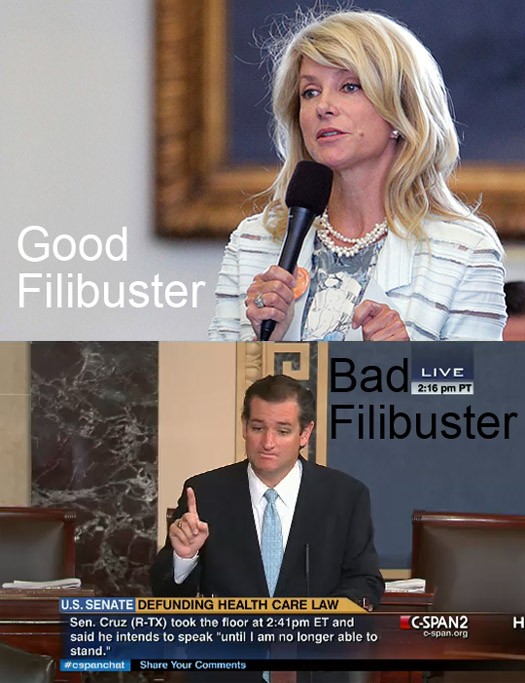Remember in June when State Senator Wendy Davis filibustered a bill designed to limit abortions in Texas after 20 weeks? She succeeded in blocking it at that moment but three weeks later it was signed into law.
In between her success and her failure, Wendy Davis was lionized as the new leader of the Democratic party in Texas. She was urged to run for Governor (something she had already flirted with previously). She was invited on every network and asked fawning questions including innumerable references to her pink sneakers.
When Davis was asked challenging questions she was unable to offer accurate answers. CNN published an op-ed Davis had written full of embarrassing references to “real Texans” all of whom agreed with Wendy Davis. No one in the media called her on it. On the contrary, the media made State Senator Wendy Davis a hero.
Today, Sen. Ted Cruz (that’s U.S. Senator not State Senator) is speaking at length on the Senate floor against Obamacare. Like Wendy Davis his effort is doomed from the outset by overwhelming numbers of the opposite party. Unlike Davis, Cruz probably has more support from the public on the underlying issue. Defunding Obamacare is not particularly popular but it is much more so than late-term abortion.

Yet despite the similarities, there is no danger of Sen. Cruz becoming a media darling. He may be asked on a few more news programs but he won’t be given softball questions and his sneakers and endearing elements of his biography will not be cooed over endlessly.
Cruz is still talking and already the NY Times has a critical op-ed which asks what Cruz hopes to accomplish with his “doomed campaign.” The author of the piece, Frank Bruni, concludes it’s all about promoting brand Cruz.
Of course the same could have been said about Wendy Davis. Did anyone at the NY Times say it? Even when noting that Davis had advanced her career once before with a filibuster, no one seemed to see self-interest as a major factor. They were too busy celebrating her “long history of persisting against tough odds.”
It’s not about winning. Davis lost. It’s not about who made the better argument. Davis didn’t make a clear argument. It’s also not about who has the public on their side. Davis did not have a majority behind her. So how does the media decide who is a hero and who is a goat?
It’s pretty hard to come up with an answer that doesn’t involve political bias in the media itself.
COMMENTS
Please let us know if you're having issues with commenting.